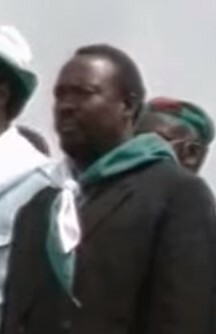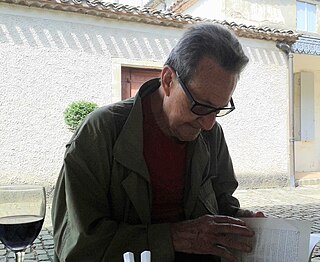Related Research Articles

Burundi originated in the 16th century as a small kingdom in the African Great Lakes region. After European contact, it was united with the Kingdom of Rwanda, becoming the colony of Ruanda-Urundi - first colonised by Germany and then by Belgium. The colony gained independence in 1962, and split once again into Rwanda and Burundi. It is one of the few countries in Africa to be a direct territorial continuation of a pre-colonial era African state.
The Hutu, also known as the Abahutu, are a Bantu ethnic group which is native to the African Great Lakes region. They mainly live in Rwanda, Burundi, and Uganda where they form one of the principal ethnic groups alongside the Tutsi and the Great Lakes Twa.
The Tutsi, also called Watusi, Watutsi or Abatutsi, are an ethnic group of the African Great Lakes region. They are a Bantu-speaking ethnic group and the second largest of three main ethnic groups in Rwanda and Burundi.

Cyprien Ntaryamira was a Burundian politician who served as President of Burundi from 5 February 1994 until his death two months later. A Hutu born in Burundi, Ntaryamira studied there before fleeing to Rwanda to avoid ethnic violence and complete his education. Active in a Burundian student movement, he cofounded the socialist Burundi Workers' Party and earned an agricultural degree. In 1983, he returned to Burundi and worked agricultural jobs, though he was briefly detained as a political prisoner. In 1986 he cofounded the Front for Democracy in Burundi (FRODEBU), and in 1993 FRODEBU won Burundi's general elections. He subsequently became the Minister of Agriculture and Animal Husbandry on 10 July, but in October Tutsi soldiers killed the president and other top officials in an attempted coup.

The Kingdom of Burundi, also known as Kingdom of Urundi, was a Bantu kingdom in the modern-day Republic of Burundi. The Ganwa monarchs ruled over both Hutus and Tutsis. Created in the 16th century, the kingdom was preserved under German and Belgian colonial rule in the late 19th and early 20th century and was an independent state between 1962 and 1966.

Mass killings of Tutsis were conducted by the majority-Hutu populace in Burundi from 21 October to December 1993, under an eruption of ethnic animosity and riots following the assassination of Burundian President Melchior Ndadaye in an attempted coup d'état. The massacres took place in all provinces apart from Makamba and Bururi, and were primarily undertaken by Hutu peasants. At many points throughout, Tutsis took vengeance and initiated massacres in response.

René Lemarchand is a French-American political scientist who is known for his research on ethnic conflict and genocide in Rwanda, Burundi and Darfur. Publishing in both English and French, he is particularly known for his work on the concept of clientelism. He is a Professor Emeritus at the University of Florida, and continues to write, teach internationally and consult. Since retiring he has worked for USAID out of Abidjan, Côte d'Ivoire as a Regional Consultant for West Africa in Governance and Democracy, and as Democracy and Governance advisor to USAID / Ghana.
Radio Cordac was a well-known Protestant missionary radio service directed to listeners throughout Central Africa. Bob and Esther Kellum, along with Burundian preachers, began communications with the government in February to get a franchise, which was granted in September 1963. Transmissions were based in Bujumbura, Burundi. The station ran from around 1963 to 1977. In 1969, it was one of only two radio stations in the entire country, sending out broadcasts in French, English, Kirundi and Swahili. Radio Cordac went off the air in 1977 when the Burundi government decided to stop private radio stations and only allow government stations. The president at the time, decided no western missionaries could stay in the country.

Burundi, officially the Republic of Burundi, is a landlocked country in the Great Rift Valley at the junction between the African Great Lakes region and Southeast Africa, with population of over 14 million people. It is bordered by Rwanda to the north, Tanzania to the east and southeast, and the Democratic Republic of the Congo to the west; Lake Tanganyika lies along its southwestern border. The capital city is Gitega and the largest city is Bujumbura.
Murehe is a village in the Commune of Bururi in Bururi Province in southern Burundi. By road it is located 21.1 kilometres southeast of Bururi. Missionaries have been present in Murehe but the village is said to have "suffered" a shortage of them. During the genocide, the Minister of the Interior met at the dispensary in Murehe in a meeting on August 7, 1996.
Vumbi is a town and seat of the Commune of Vumbi in Kirundo Province in northern Burundi. By road it is located 15 kilometres (9.3 mi) southeast of Kirundo on RN 14. During the genocide, the Minister of the Interior met at Vumbi in a meeting on August 7, 1996.

On 8 July 1966, a coup d'état took place in the Kingdom of Burundi. The second in Burundi's post-independence history, the coup ousted the government loyal to the king (mwami) of Burundi, Mwambutsa IV, who had gone into exile in October 1965 after the failure of an earlier coup d'état.
Roberto Régnier was a Belgian Colonial official in Ruanda-Urundi. He served as Regent from 28 July 1961 to January 1962 and as High Representative of Burundi for no more than six months starting in January 1962.

The Ikiza, or the Ubwicanyi (Killings), was a series of mass killings—often characterised as a genocide—which were committed in Burundi in 1972 by the Tutsi-dominated army and government, primarily against educated and elite Hutus who lived in the country. Conservative estimates place the death toll of the event between 100,000 and 150,000 killed, while some estimates of the death toll go as high as 300,000.

On 21 October 1993, a coup was attempted in Burundi by a Tutsi–dominated army faction. The coup attempt resulted in assassination of Hutu President Melchior Ndadaye and the deaths of other officials in the constitutional line of presidential succession. François Ngeze was presented as the new President of Burundi by the army, but the coup failed under domestic and international pressure, leaving Prime Minister Sylvie Kinigi in charge of the government.
Thaddée Siryuyumunsi was a Burundian politician who served as President of the National Assembly from 1961 to 1965.
The Kamenge incidents or Kamenge riots were a series of armed raids and murders conducted in the Kamenge quarter of Bujumbura, Burundi in January 1962. They were perpetrated by militants of the Jeunesse Nationaliste Rwagasore against Hutu leaders of the Syndicats Chrétiens trade union and the Parti du Peuple. The Kamenge incidents were the first major instance of ethnic violence in modern Burundi.

Relations between Burundi and Rwanda have existed for at least as long as the states themselves. Before contact with Europeans, Rwanda and Burundi were kingdoms competing to gain control over nearby territory. In the 1880s, the two kingdoms were placed under colonial authority, first by Germany, and then by Belgium after 1919.
Amédée Kabugubugu (1934/1935–1972) was a Burundian educator, politician, and diplomat.
References
- ↑ Europa Publications (2004). Africa South of the Sahara 2004, Volume 33. Routledge. p. 136. ISBN 1-85743-183-9.
- ↑ Lemarchand, René, "Burundi: ethnic conflict and genocide." Cambridge University Press (1996) ISBN 978-0-521-56623-0. Page xvii. Retrieved February 26, 2011
- ↑ Lemarchand, René (1996). Burundi: ethnic conflict and genocide. Cambridge University Press. p. xxi. ISBN 0-521-56623-1.
- ↑ "Burundi: Vice-President Resigns". Africa Research Bulletin: Political, Social and Cultural Series. Vol. 44. December 2007. pp. 17296A –17296C.